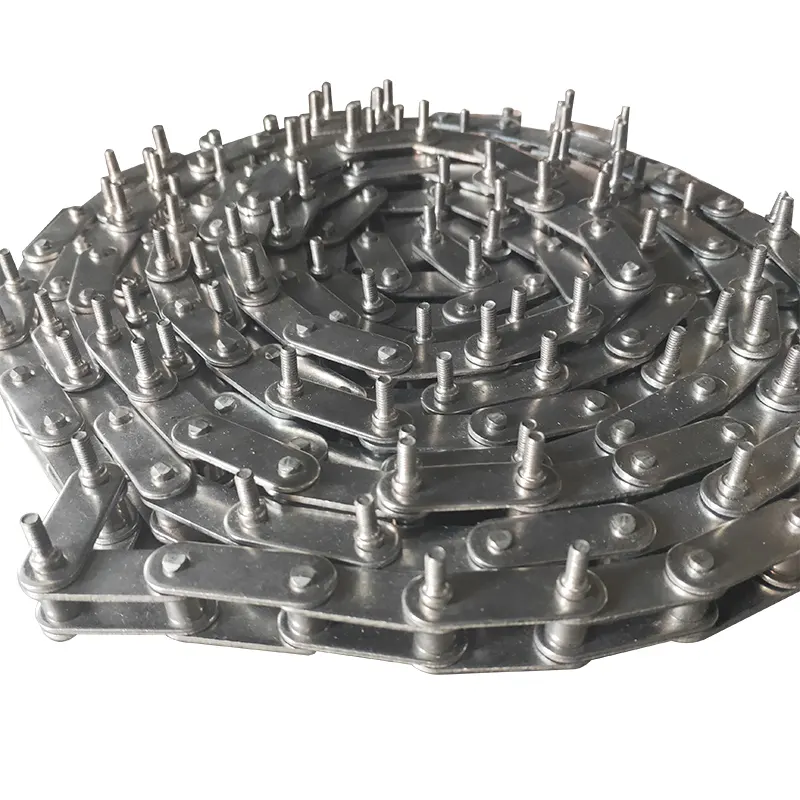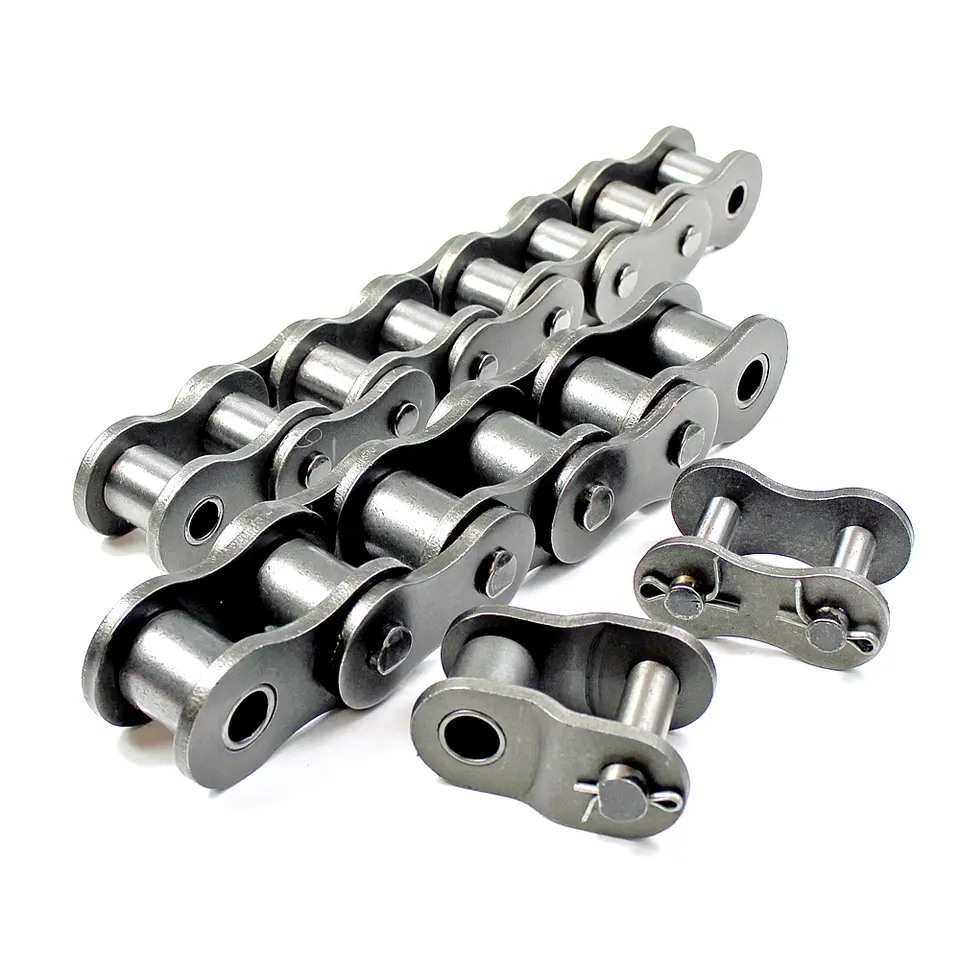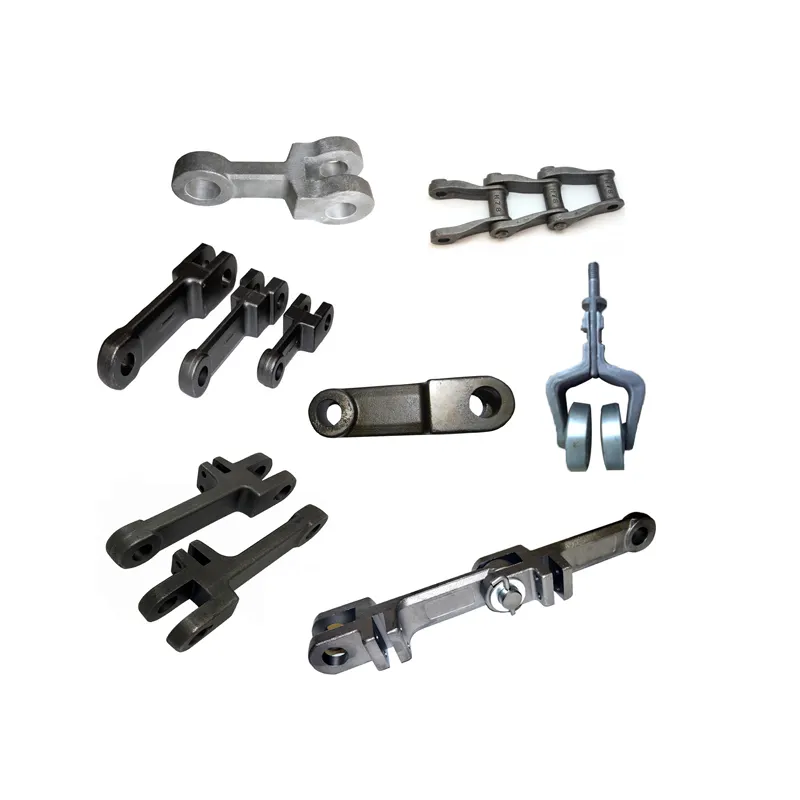Product Description
Harvester Chains of Carton Steel (415S)
PRODUCT SHOW
PRODUCT DETAILS
Product Parameters
| Standard | GB, ISO, ANSI, DIN |
| Type | Standard A and standard B precision roller chain, conveyor chain; |
| special chain with accessories, welding chain, leaf chain and sprocket | |
| ANSI chain No. | 40,50,60,80,100,120,140,160,180,200,240; |
| C40,C50,C60,C80,C100,C120,C140,C160; | |
| DIN/ISO chain No. | 08A,10A,12A,16A,20A,24A,28A,32A,36A,40A,48A; |
| C08A,C10A,C12A,C16A,C20A,C24A,C28A,C32A; | |
| Application | Food processing, pharmaceutical and chemical industries, electronics, machinery; |
| household appliances, automotive manufacturing, metallurgy, sewage treatment | |
| Series | A series, B series |
More Products
Advantage
Certifications
DETAILS ABOUT CHINAMFG CHAIN
Exhibition
Workshop
Application
Packaging Details
Shipping
FAQ
1. Are you a manufacturer or trade Company?
We are a factory founded in 1997 with a trade team for international service.
2. What terms of payment do you usually use?
T/T 30% deposit and 70% against document, Western Union, L/C at sight
3. What is your lead time for your goods?
Normally 35 days after confirmed order. 30 days could be available in the low season for some items (during May to July), and 45 days during the new year and hot season ( Jan to March).
4. Samples
For customers who need sample confirmation before ordering, please bear in mind that the following policy will be adopted:
1) All samples are free of charge with a maximum value not exceeding USD 100.
2) The courier cost for the first-time sample sending will be charged by the consignee. We will send the samples with freight to be collected. So please inform your account with FedEx, UPS, DHL, or TNT so that we can proceed promptly.
3) The first-time courier cost will be totally deducted from the contract value of the trial cooperation.
| Usage: | Transmission Chain, Conveyor Chain, Agricultural Machine |
|---|---|
| Material: | Alloy/Carbon Steel |
| Surface Treatment: | Polishing |
| Feature: | Heat Resistant |
| Chain Size: | All Sizes |
| Structure: | Agricultural Machine |
| Customization: |
Available
| Customized Request |
|---|

What are the benefits of using a corrosion-resistant material for a transmission chain?
Using a corrosion-resistant material for a transmission chain offers several advantages. Here’s a detailed answer to the question:
Corrosion-resistant materials, such as stainless steel or specialized coatings, provide the following benefits for transmission chains:
1. Enhanced Durability: Corrosion can significantly reduce the lifespan of a transmission chain by causing surface degradation, pitting, or rusting. By using a corrosion-resistant material, the chain’s durability is improved, allowing it to withstand exposure to harsh environments, chemicals, moisture, and temperature variations.
2. Extended Service Life: Corrosion-resistant materials help prevent or minimize the formation of rust or corrosion on the chain’s surface. This extends the chain’s service life, reducing the frequency of replacements and associated downtime and maintenance costs.
3. Reliable Performance: Corrosion can negatively impact the performance of a transmission chain by increasing friction, decreasing flexibility, and impairing the smooth engagement with sprockets or other components. Using a corrosion-resistant material ensures consistent and reliable performance, allowing the chain to operate smoothly and efficiently.
4. Reduced Maintenance: Corrosion-resistant transmission chains require less maintenance compared to chains made from non-corrosion-resistant materials. They are less prone to surface damage, require fewer lubrication intervals, and generally demand less attention to prevent deterioration. This results in reduced maintenance efforts and costs.
5. Suitable for Challenging Environments: Many industries and applications expose transmission chains to corrosive substances, moisture, humidity, or high temperatures. Using a corrosion-resistant material ensures that the chain can perform reliably in these challenging environments, such as marine, chemical processing, food processing, or outdoor applications.
6. Improved Safety: Corrosion can compromise the integrity and strength of a transmission chain, potentially leading to chain failure or unexpected equipment downtime. Utilizing a corrosion-resistant material helps maintain the chain’s structural integrity, reducing the risk of accidents, equipment failures, and associated safety hazards.
It’s important to consider the specific requirements of the application and the level of corrosion resistance needed when selecting a transmission chain material. Factors such as environmental conditions, temperature, exposure to chemicals, and industry standards should be taken into account to ensure optimal performance and longevity of the chain.

How does the precision of manufacturing impact the performance of a transmission chain?
The precision of manufacturing plays a crucial role in the performance and reliability of a transmission chain. Here’s a detailed answer to the question:
1. Accurate Chain Pitch: The precision of manufacturing ensures that the chain pitch, which is the distance between consecutive chain links, is consistent and accurate. A precise chain pitch is essential for proper engagement with the sprockets and ensures smooth power transmission.
2. Uniform Chain Link Dimensions: Precise manufacturing ensures that the dimensions of the chain links are uniform throughout the chain. This uniformity is crucial for maintaining proper alignment, load distribution, and engagement with the sprockets.
3. Consistent Roller Diameter: In roller chains, the diameter of the rollers is an important factor in reducing friction and wear. Precise manufacturing ensures that the roller diameter is consistent, allowing for smooth rolling action and efficient power transfer.
4. Straight Side Plates: The side plates of a transmission chain need to be straight and parallel to ensure proper chain alignment and engagement with the sprockets. Precise manufacturing ensures that the side plates are accurately formed, minimizing the risk of misalignment and premature wear.
5. Quality Control and Tolerance Management: Precision manufacturing involves rigorous quality control measures to ensure that the chain components meet the required specifications and tolerances. This helps to maintain the overall integrity and performance of the chain.
6. Reduced Noise and Vibration: A well-manufactured transmission chain with precise dimensions and uniform components results in reduced noise and vibration during operation. This contributes to a quieter and smoother running system, enhancing the overall efficiency and comfort.
7. Enhanced Durability and Lifespan: The precision of manufacturing directly impacts the durability and lifespan of a transmission chain. Accurate dimensions, uniform components, and proper tolerances ensure that the chain can withstand the expected loads, resist wear, and maintain its performance over an extended period.
It’s important to select transmission chains from reputable manufacturers known for their precision manufacturing processes and adherence to quality standards. Proper installation, regular maintenance, and following manufacturer guidelines are also crucial for maximizing the performance and longevity of the transmission chain.

What are the maintenance requirements for transmission chains?
Maintenance plays a crucial role in ensuring the optimal performance and longevity of transmission chains. Here’s a detailed explanation:
1. Regular Inspection: Regular visual inspections should be conducted to check for any signs of wear, damage, or misalignment. Inspect the chain for signs of elongation, corrosion, broken or damaged links, and excessive wear on the sprockets.
2. Lubrication: Proper lubrication is essential to minimize friction, reduce wear, and extend the life of the chain. Follow the manufacturer’s recommendations for the type and frequency of lubrication. Apply lubricant evenly along the entire length of the chain, ensuring that it penetrates between the components.
3. Tensioning: Maintaining the correct tension in the chain is important for smooth operation and to prevent chain slippage. Follow the manufacturer’s guidelines for the recommended tensioning method and the appropriate tension level. Check the tension regularly and adjust as necessary.
4. Cleaning: Regular cleaning helps remove dirt, debris, and contaminants that can accelerate wear and cause chain failure. Use a suitable cleaning agent or solvent to clean the chain, and ensure it is thoroughly dry before applying lubrication.
5. Alignment: Proper alignment between the chain and the sprockets is crucial for smooth operation and to prevent premature wear. Check the alignment regularly and make any necessary adjustments to ensure the chain runs straight and smoothly along the sprockets.
6. Replacement of Worn Components: Over time, transmission chains may experience wear and elongation. It is important to replace worn-out components such as links, pins, and sprockets to maintain the proper functioning of the chain.
7. Environmental Considerations: Consider the operating environment of the transmission chain and take appropriate measures to protect it from corrosive substances, extreme temperatures, or excessive humidity. Apply corrosion-resistant coatings or use stainless steel chains when necessary.
8. Record Keeping: Maintain a record of maintenance activities, including lubrication schedules, tension adjustments, inspections, and component replacements. This record will help track the maintenance history and identify any patterns or issues that may arise.
It is important to consult the manufacturer’s guidelines and recommendations for specific maintenance requirements based on the type and model of the transmission chain. Adhering to proper maintenance practices will help ensure the reliability, performance, and longevity of the transmission chain in various applications.


editor by CX 2023-12-12